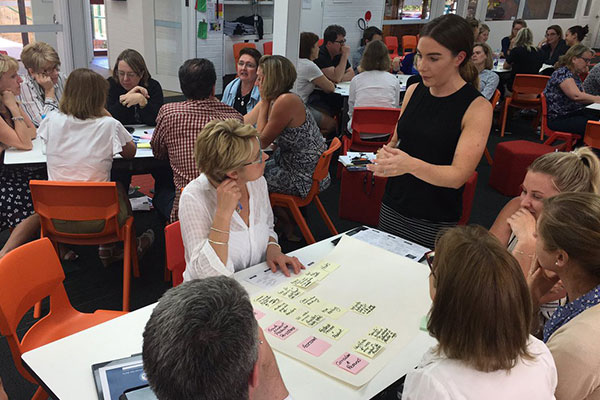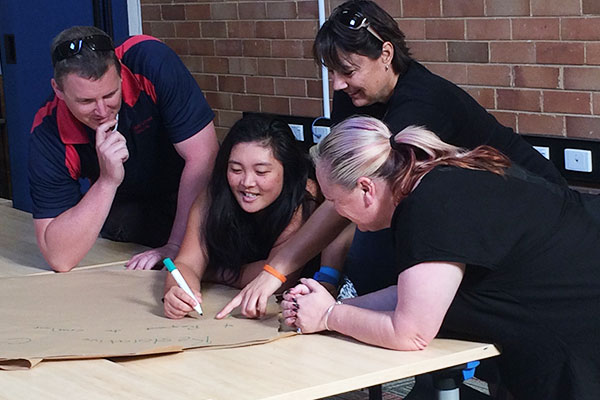Recap – Part 1: Why do independent schools undertake school based research?
As a professional activity, conducting school based research can provide opportunities to transform research knowledge into pedagogical knowledge, increase conceptual understanding, and facilitate reflection and questioning of practice1. Educators engage in school based research for a variety of reasons.
- As a driver of whole school change
- To affirm and/or clarify issues or a direction
- For an in-depth understanding of an existing area
- As professional learning.
Part 2 of this series considers the benefits of engaging in school based research and the opportunities it provides to enhance practice and support student learning.
School based research involves high quality investigations undertaken in schools by educators and supported by experts where appropriate. The aim is to generate knowledge that is directly applicable to a school context and community, and to improve evidence informed practice and research capacity. It offers a range of localised benefits, while also contributing to the broader educational research knowledge base.

Ravenswood School for Girls – Improvement science and the development of resilient agency (2015)
Explore challenges
Successful school based research is best determined by the school and reflects areas of importance pertinent to the school community. These investigations often align with identified needs ensuring they are relevant, timely and context specific. As the process supports deep exploration and learning, findings are more likely to result in a change in practice than when knowledge comes from external sources2,3,4. When undertaken with rigour, the evidence gathered illustrates that interventions or programs investigated are effective in complex school ecosystems. This may make it is easier for educators to apply relevant insights to their own school communities.
Support evidence informed practice
Fifteen years ago Walker suggested that it takes up to twenty years for impactful practice identified by research to be effectively embedded5. Although research dissemination methods and channels have improved, the research to practice gap remains a sticky, multi-dimensional problem6. Engaging in school based research is one way to accelerate this process, especially when aiming for broader and sustainable change7,8. It encourages educators to bridge the research to practice gap by exploring evidence and investigating the impact of their practice on student learning. As a result, educators are more likely to maintain relevant and future focused practices, ensuring students are equipped for the world beyond school.

Avondale School – Impact of faith development activities on school climate (2017)
Drive change
The embedded nature of school based research is recognised for its ability to inform change and transform practice, which can occur at classroom or the whole school level9. Rigorous evidence reflecting the reality of the school context can help to drive change processes and validate the need for change. It can also be used to establish the sense of urgency needed to motivate change across all stakeholder groups, bringing everyone along on the journey. Evidence can also help to disentangle some of the complexities of school environments, making them less challenging and clearing a path for change.
Measure impact
Undertaking school based research offers an opportunity to measure the impact of new initiatives and interventions. Designing rigorous research involves collecting targeted baseline data that can be used to monitor impact over time. Ongoing measurement can provide quality data to support recommendations for adjustments or actions emerging from the research. Changes to initiatives and interventions can be embedded as evidence is generated, supporting an ongoing cycle of measuring impact8,10.

Key College – Restorative practices and learning outcomes (2015)
Build research capacity
School based research teams are actively involved in all aspects of their investigation and through this process engage with other high quality evidence. This can lead to an increase in research literacy, recognised as an important dimension of an educator’s professional identity. Engaging in school based research ensures that research skills are not learned in isolation and complement the development of practical experience, subject and pedagogical knowledge8. As an embedded practice it can help support the translation of evidence informed practice into common practice11. In this way skill development does not overshadow the goal of using evidence10, increasing the likelihood of improving student outcomes.
Value practitioner experience
Sharing research with the broader education community encourages practitioners to engage with external knowledge and evidence. This surfaces the expertise of those educators involved in the research legitimising their ideas and approaches12. Research conducted in schools is repositioned as valuable, insightful, impactful and contributing to a deeper educational knowledge base. As this research reflects educator voice and experience, its relevance becomes more apparent, in turn enabling cultures of research engagement to flourish.
Evidence generated by school based research provides a platform for schools to connect with each other, and communicate with experts whose research informs their investigation. This helps to empower educator voice and experience, and is an effective way to increase the impact and reach of knowledge gained. In this way, educators actively contribute to decreasing the research to practice gap, whilst improving student outcomes.
Part 3 of this series will highlight the factors that enable successful school based research.
The team at The Evidence Institute undertakes research and shares evidence focusing on a range of areas impacting the education sector. We aim to generate high-quality evidence to transform educational futures for independent school students, staff, and communities. Through a range of initiatives and tailored supports, the team also partners with schools to bridge the research to practice gap, build school-based research capacity, and enhance the evidence-informed nature of the teaching profession. For further information, contact Tiffany Roos, Director: The Evidence Institute.
1. Cain, T. (2015). Teachers' engagement with published research: Addressing the knowledge problem. Curriculum Journal, 26(3), 488-509
2. Brown, J.S., Collins, A., & Duguid, P. (1989). Situated cognition and the culture of learning. Educational Researcher, 18(1), 32-42.
3. McNiff, J. (2013). Action research: Principles and practice. (3rd ed.) Routledge.
4. Rowell, L., Bruce, C., Shosh, J. M., & Riel, M. (Eds.). (2017). The Palgrave International Handbook of Action Research. US: Palgrave Macmillan.
5. Walker, H. M. (2004). Commentary: Use of evidence-based interventions in schools: Where we've been, where we are, and where we need to go. School Psychology Review, 33(3), 398.
6. Hornby, G., Gable, R. A., & Evans, W. (2013). Implementing evidence-based practice in education: What international literature reviews tell us and what they don’t. Preventing School Failure: Alternative Education for Children and Youth, 57(3), 119-123
7. BERA, & RSA. (2014). Research and the teaching profession: Building the capacity for a self-improving education system.
8 Timperley, H., Wilson, A., Barrar, H., & Fung, I. (2007). Teacher professional learning and development: Best evidence synthesis iteration [BES}.
9. Bobis, J., & Ewing, R. (2017). Transforming educational practice through action research: Three Australian examples. In L. Rowell, C. Bruce, J. M. Shosh, & M. Riel (Eds.), The Palgrave International Handbook of Action Research. US: Palgrave Macmillan.
10. Nelson, J., & O'Beirne, C. (2014). Using evidence in the classroom: What works and why?
11. Productivity Commission. (2016). National education evidence base: Productivity Commission inquiry report. Commonwealth of Australia
12. Lambert, P. (2018). School-Based Research Program: Review report. Association of Independent Schools NSW.